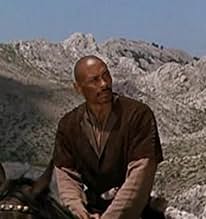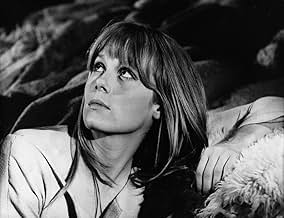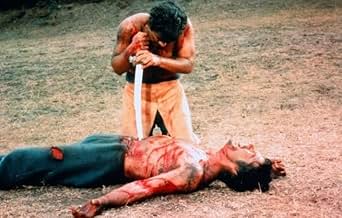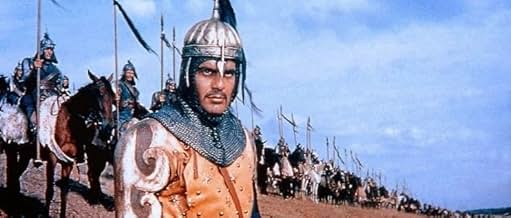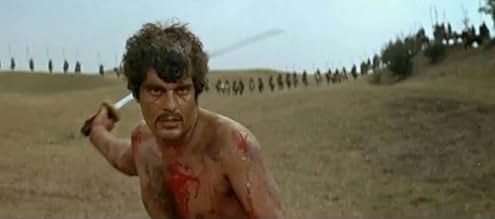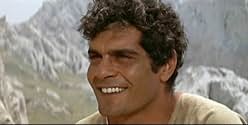IMDb-BEWERTUNG
5,8/10
2682
IHRE BEWERTUNG
Füge eine Handlung in deiner Sprache hinzuDuring the thirteenth century, the shy Mongol boy Temujin becomes the fearless leader Genghis Khan, who unites all Mongol tribes and conquers most of Asia, Europe, and the Middle East.During the thirteenth century, the shy Mongol boy Temujin becomes the fearless leader Genghis Khan, who unites all Mongol tribes and conquers most of Asia, Europe, and the Middle East.During the thirteenth century, the shy Mongol boy Temujin becomes the fearless leader Genghis Khan, who unites all Mongol tribes and conquers most of Asia, Europe, and the Middle East.
- Regie
- Drehbuch
- Hauptbesetzung
Françoise Dorléac
- Bortei
- (as Francoise Dorleac)
Susanne Hsiao
- Chin Yu
- (as Suzanne Hsaio)
Empfohlene Bewertungen
This has about as much to do with the real Genghis Khan as the Hughes film"The Conquerer".If you want to know about the real historical figure,read Lamb's 1920s book.That aside,we have to appreciate the production values of the film.Sets,props,etc.,are all ok.None of these people,however,can scarcely be imagined as Central Asians.Greek Savalas and Alabaman Strode come closest.Wallach,as the Shah,makes an acceptable sly villain,and not an unbelievable Levantine.Everybody else is not only much too European,but much too Nordic,as well.(Sharif is only a minor exception to this generalisation.)And Morley,Mason,and Hordern all act as though they wandered in from a road company of "The Mikado".Watch this film for amusement,and perhaps free-wheeling historical fiction(aka Robert E. Howard),but don't take it too seriously.
Irving Allen went all the way to Yugoslavia to make this foolish attempt in Technicolor and Panavision to capitalise on Omar Sharif's new-found celebrity which actually carried a disclaimer from Talking Pictures for the myriad racial caricatures on display.
The international cast represents every conceivable ethnicity except for a bona fide Mongolian. Familiar Asian types include Stephen Boyd, James Mason, Robert Morley, Michael Hordern, Telly Savalas, Eli Wallach, Woody Strode, Yvonne Mitchell, Kenneth Cope and Jacqueline Pearce (the latter pair playing Francois Dorleac's brother and Wallach's daughter; the craziest line being Miss Dorleac's description of herself as "ugly-looking").
The international cast represents every conceivable ethnicity except for a bona fide Mongolian. Familiar Asian types include Stephen Boyd, James Mason, Robert Morley, Michael Hordern, Telly Savalas, Eli Wallach, Woody Strode, Yvonne Mitchell, Kenneth Cope and Jacqueline Pearce (the latter pair playing Francois Dorleac's brother and Wallach's daughter; the craziest line being Miss Dorleac's description of herself as "ugly-looking").
This is a biopic of Temujin (Carlo Cura/Omar Sharif). This starts with the massacre of his tribe and being taken captive. He would escape and slowly rebuild his tribe. His shaman explains that there are three circles. Their middle circle is full of poor fighting tribes while the Chinese and the white Westerners are rich in the two outer circles. He would conquer the whole Mongolian steppe and meet the Chinese emperor.
This is an old Hollywood epic. It follows the tradition of western actors playing Asian characters. I don't expect any better but it is still very old fashion and dated. The story is fictional, but to be fair, the actual history is mostly written legends and oral traditions. The story does lose steam over time. There is no criticizing the caliber of the cast despite their incorrect race. It's all very grand and very old.
This is an old Hollywood epic. It follows the tradition of western actors playing Asian characters. I don't expect any better but it is still very old fashion and dated. The story is fictional, but to be fair, the actual history is mostly written legends and oral traditions. The story does lose steam over time. There is no criticizing the caliber of the cast despite their incorrect race. It's all very grand and very old.
I have to admit I didn't think this film was half as bad as I have been led to believe through negative reviews here on IMdB and elsewhere. So, if it isn't all bad ... I agree it isn't historically accurate but neither was Elizabeth and 100s of other 'historical' films. It is a bit leaden in places, true. Francoise Dorleac gets a bit tiresome although even she has her moments. The script may be a bit dodgy in places but looking at what we get in recent years ... I don't have a problem with Sharif in the title role at all - I thought he was fine. The 'Chinese' being Mason and Morley was distracting but even at their worst these two were always entertaining. Eli Wallach and Michael Hordern make interesting appearances. Even done on the cheap the film doesn't look bad and I enjoyed it better than, say, Demetrius and the Gladiators. And then there was cute Stephen Boyd if all else failed, always a pleasure to watch. Genghis Khan a turkey? Let's just say 'I've seen worse'.
Not quite as bad as John Wayne's famed turkey THE CONQUEROR, but getting there. Problem was with this flick, the makers dumped historical accuracy in favor of developing a Ben-Hur-Messala type confrontation between Genghis Khan (Sharif, at the height of his popularity) and his nemesis, a scowling bewhiskered Jamuga (none other than "Messala" himself - Stephen Boyd)
Plenty of Mongol action and cruelty and the concluding battle between Sharif and Boyd is pretty in-your-face stuff. Production values were OK and suitably epic-ish in feel. The wheels start to fall off though with Robert Morley as the Chinese Emperor, some throwback to his role in 55 DAYS IN PEKING and worse, mega-british James Mason as Kam Ling, as likely a chinese adviser to Morley as Adam Sandler playing Abraham Lincoln. In a minor role as Subatai, Kenneth Cope is struggling to hold down any credibility whatsoever, having been first-string comic relief to David Frost on the THAT WAS THE WEEK THAT WAS TV show.
Not for the epic Hall of Fame I'm afraid!
Plenty of Mongol action and cruelty and the concluding battle between Sharif and Boyd is pretty in-your-face stuff. Production values were OK and suitably epic-ish in feel. The wheels start to fall off though with Robert Morley as the Chinese Emperor, some throwback to his role in 55 DAYS IN PEKING and worse, mega-british James Mason as Kam Ling, as likely a chinese adviser to Morley as Adam Sandler playing Abraham Lincoln. In a minor role as Subatai, Kenneth Cope is struggling to hold down any credibility whatsoever, having been first-string comic relief to David Frost on the THAT WAS THE WEEK THAT WAS TV show.
Not for the epic Hall of Fame I'm afraid!
Wusstest du schon
- WissenswertesSet in Asia, the movie was shot in Yugoslavia.
- PatzerChinese men wear their hair in a pigtails. At the time, men wore long hair in a topknot. They didn't wear pigtails until the Qing/Manchu dynasty (1644-1912).
- Zitate
Emperor of China: It is better to light one candle than to curse the darkness.
- Alternative VersionenAll UK releases are cut by one min three secs. The cinema version was cut for nudity and later video releases also included additional edits for horse-falls and to a rape scene. In the latest UK DVD release, the only cuts are for dangerous horse falls (35 seconds).
- VerbindungenFeatured in Cinema Komunisto (2010)
Top-Auswahl
Melde dich zum Bewerten an und greife auf die Watchlist für personalisierte Empfehlungen zu.
- How long is Genghis Khan?Powered by Alexa
Details
- Erscheinungsdatum
- Herkunftsländer
- Sprache
- Auch bekannt als
- Genghis Khan
- Drehorte
- Jugoslawien(Press book)
- Produktionsfirmen
- Weitere beteiligte Unternehmen bei IMDbPro anzeigen
Box Office
- Budget
- 3.500.000 $ (geschätzt)
- Laufzeit2 Stunden
- Seitenverhältnis
- 2.35 : 1
Zu dieser Seite beitragen
Bearbeitung vorschlagen oder fehlenden Inhalt hinzufügen




